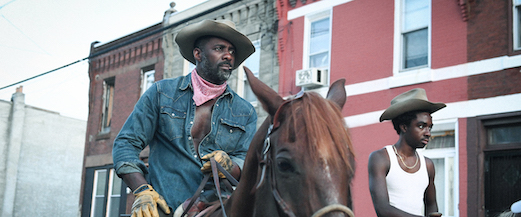|
|
The 400-Word Review: Concrete CowboyBy Sean CollierApril 1, 2021
Everyone in the neighborhood — including Smush, who dreams of owning a western ranch, and local beat cop Leroy (Clifford “Method Man” Smith) — is obsessed with horses, and most pitch in at the stable. Their efforts aren’t enough to keep the city off their backs, but that drama plays as a B-plot to Cole’s. Elba’s effortless command of the screen makes even his most passive scenes compelling, and McLaughlin — known for his role on “Stranger Things” — fights madly to establish his own chops, landing some solid blows in the process. The cast is repeatedly abandoned, however, by the go-nowhere script. Director and co-writer (with Dan Walser) Ricky Staub doesn’t seem to know what to do from one scene to the next; I was sure, for example, that the movie was seeding romantic feelings between Smush and Cole, but I was either badly mistaken or they forgot to bring that story to any conclusion. Given the subject matter, it also feels unusual to have a white director and two white writers behind the scenes. The film is based on a book by a Black author, but something appears to be missing in the adaptation. When Cole first comes face-to-face with the horse he will make his own, “Concrete Cowboy” finds its only transcendent moment — one of contrast, pitting the surprising size of the untamed animal against Cole’s tiny frame. Here, the film understands both the incongruity and the subsequent power of this reclamation of space — the boldness of staking a claim on the city with traditional wildness. Had there been more of these moments, “Concrete Cowboy” might’ve been notable. My Rating: 5/10 “Concrete Cowboy” is streaming on Netflix.
[ Read more 400 word movie reviews ]
[ View other movie reviews ]
[ View other columns by Sean Collier ] [ Email this column ]
|

|
|
|

|
Thursday, October 31, 2024
© 2024 Box Office Prophets, a division of One Of Us, Inc.


